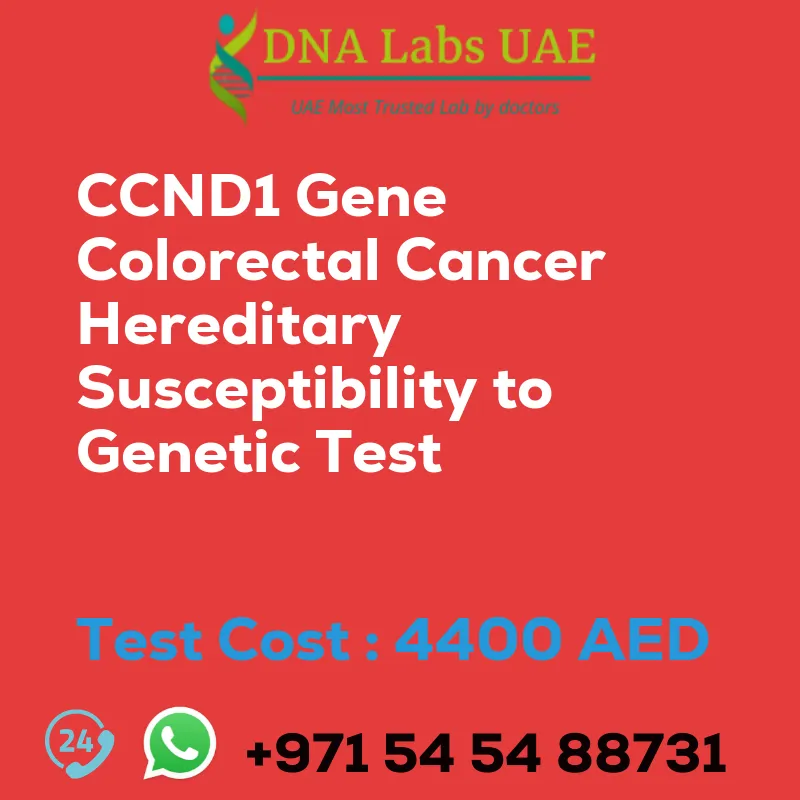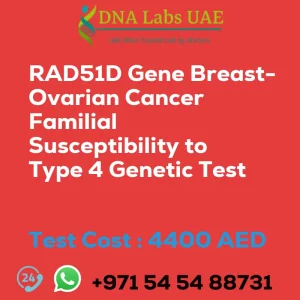CCND1 Gene Colorectal Cancer Hereditary Susceptibility to Genetic Test
At DNA Labs UAE, we offer the CCND1 Gene Colorectal cancer hereditary susceptibility to Genetic Test at a price of 4400.0 AED. This test is used to determine the risk of developing colorectal cancer based on genetic factors.
Test Details
The CCND1 gene codes for a protein called cyclin D1, which plays a role in regulating the cell cycle. Mutations in this gene have been linked to various types of cancer, including colorectal cancer.
Colorectal cancer is the third most common cancer worldwide and can be caused by a combination of genetic and environmental factors. In some cases, there is a hereditary component to the disease, meaning that certain genetic mutations can increase the risk of developing colorectal cancer.
NGS Technology
Our CCND1 Gene Colorectal cancer hereditary susceptibility to Genetic Test utilizes NGS (Next-Generation Sequencing) technology. This advanced genetic testing method allows for the simultaneous sequencing of multiple genes, providing a comprehensive analysis of an individual’s genetic makeup.
NGS genetic testing can identify mutations or variations in genes such as CCND1 that may increase an individual’s susceptibility to colorectal cancer. This information can be used to develop personalized medical management strategies, including increased surveillance, preventive measures, or targeted therapies.
Pre Test Information
Prior to undergoing the CCND1 Gene Colorectal cancer hereditary susceptibility to Genetic Test, it is important to provide a clinical history of the patient. This includes information about any family members who have been affected by CCND1 Gene Colorectal cancer. A genetic counseling session will also be conducted to draw a pedigree chart of the family members.
Report Delivery and Test Department
After the test is conducted, the report will be delivered within 3 to 4 weeks. The test is conducted by our Genetics department, under the supervision of an Oncologist.
Who Should Undergo Genetic Testing?
It is important to note that NGS genetic testing is not recommended for everyone. It is typically reserved for individuals with a strong family history of colorectal cancer or other risk factors that suggest a potential hereditary component to the disease.
Genetic testing should always be done under the guidance of a healthcare professional who can interpret the results and provide appropriate counseling and follow-up care.
| Test Name | CCND1 Gene Colorectal cancer hereditary susceptibility to Genetic Test |
|---|---|
| Components | |
| Price | 4400.0 AED |
| Sample Condition | Blood or Extracted DNA or One drop Blood on FTA Card |
| Report Delivery | 3 to 4 Weeks |
| Method | NGS Technology |
| Test type | Cancer |
| Doctor | Oncologist |
| Test Department: | Genetics |
| Pre Test Information | Clinical History of Patient who is going for CCND1 Gene Colorectal cancer, hereditary, susceptibility to NGS Genetic DNA Test. A Genetic Counselling session to draw a pedigree chart of family members affected with CCND1 Gene Colorectal cancer, hereditary, susceptibility to NGS Genetic DNA Test gene CCND1 |
| Test Details |
The CCND1 gene is a gene that codes for a protein called cyclin D1, which is involved in regulating the cell cycle. Mutations in this gene have been associated with various types of cancer, including colorectal cancer. Colorectal cancer is a type of cancer that affects the colon or rectum. It is the third most common cancer worldwide and can be caused by a combination of genetic and environmental factors. In some cases, there is a hereditary component to colorectal cancer, meaning that certain genetic mutations can increase a person’s susceptibility to developing the disease. NGS (Next-Generation Sequencing) genetic testing is a type of genetic test that allows for the simultaneous sequencing of multiple genes. It can provide a comprehensive analysis of an individual’s genetic makeup and identify mutations or variations that may be associated with an increased risk of developing certain diseases, including colorectal cancer. In the context of colorectal cancer, NGS genetic testing can be used to identify mutations in genes such as CCND1 that may increase an individual’s susceptibility to the disease. This information can be used to inform personalized medical management strategies, including increased surveillance, preventive measures, or targeted therapies. It is important to note that NGS genetic testing is not typically recommended for everyone. It is usually reserved for individuals with a strong family history of colorectal cancer or other risk factors that suggest a potential hereditary component to the disease. Genetic testing should be done under the guidance of a healthcare professional who can help interpret the results and provide appropriate counseling and follow-up care. |








